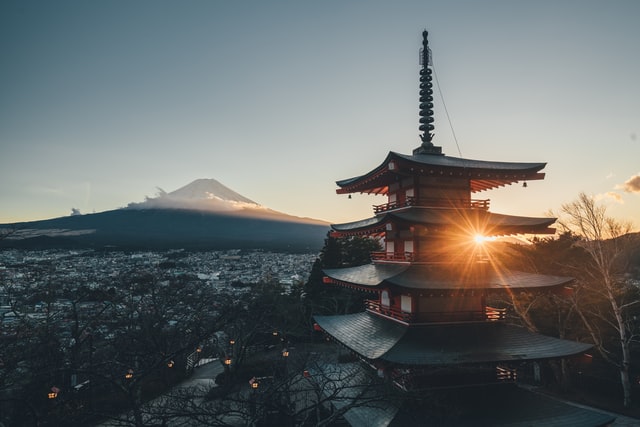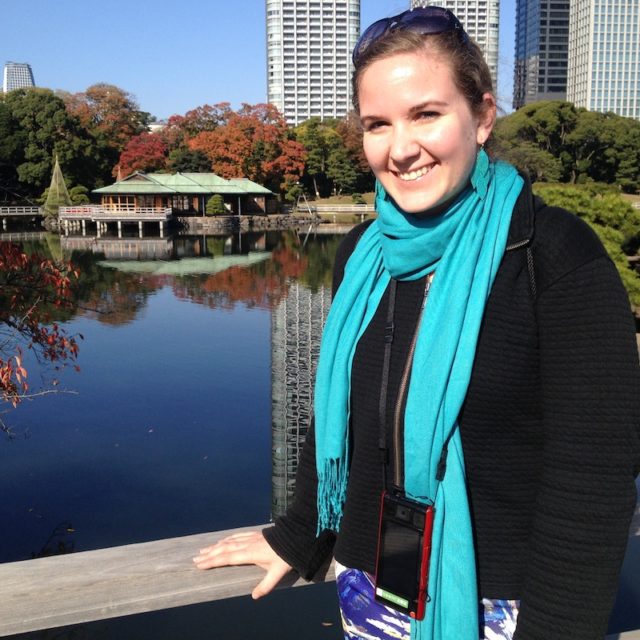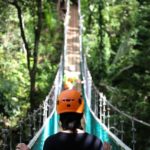5 Helpful Tips for Solo Travel in Japan

As an avid traveler and the daughter of two Pan Am flight attendants, it’s no wonder that I ventured out on my own to travel from a fairly young age. One of my most challenging and rewarding solo travel experiences was during my time living in Delhi, India, when I traveled around the northern region of the amazing country that took me in for a few months. I thought I had solo travel down to an art after that trip; I had traveled on an overnight train without a companion, gotten stranded in Mumbai–a city I had never been to before–at 1 a.m., and successfully found a safe place to stay.
However, when traveling in Japan in November of last year, I realized (once again) that there are always more lessons to learn in travel. Solo travel in Japan was very different from any other experience I had previously: still invigorating and eye opening, but a little more isolating than I was used to.
Here are five tips to keep in mind when traveling solo in Japan:
Travel Japan: 5 Tips for Solo Travel in Japan
1. Learn enough of the language to navigate, and have something on hand to translate easily when needed.
This is a general rule for travel anywhere, solo or otherwise. However, coming from an English-speaking background and studying romance languages in high school and college, I found that the language factor was more significant in Japan than anywhere else I had been.
In some places, especially the smaller city layover stops on my train journey, many of the signs were only in kanji, a system of Japanese writing using characters instead of letters. Having a book with common phrases and words translated (something not reliant on battery power for the longer journeys) was immensely helpful as I tried to navigate travel across the country.
I found that the phrase yoroshiku, meaning “please help me as best you can,” helped a lot of interactions when the language barrier was particularly trying. When I was struggling with something, like ordering and paying for my food at a vending machine in a restaurant in Tokyo, I used the phrase Ganbarimasu with a lot of enthusiasm to indicate that I was trying my best to use the system. This usually resulted in someone coming over to show me how to use it. Politeness and eagerness seemed to go a long way.
2. Leave extra time to get to your next destination.
Again, this is good advice generally, but especially in solo travel when you have to rely entirely on your own knowledge to figure everything out. When arriving in Tokyo from Narita, it took me a lot longer to get from the train station to my hotel than I had anticipated.
This was due in part to the vast size of the main train station in Tokyo, and the numerous different train lines to figure out. Fortunately, my limited language skills and a very helpful agent who held up 5 fingers to tell me which track to go to got me there. I didn’t schedule my trip too much anyway, but for the few things that I did plan, I was sure to leave a lot of extra time to get there, which cut down on stress.
3. Be especially cautious about going out in the evenings.
This does not mean going inside directly after dark, or that I ever felt unsafe going out to dinner on my own. However, I made time during the day to visit the locations I would be going in the evening, and figured out exactly how to get back to my hotel from there. I wasn’t doing any new exploring after sundown, and I made sure I could navigate without the use of a map or my phone so that I didn’t make myself a target by looking lost. Confidence is key.
Tokyo was so vast, and I only had a limited time to find my bearings, so I did as much exploring as I could during the daytime to cut down on the possibility of taking a wrong turn in the dark.
I felt this most especially in Tokyo and Hiroshima. Tokyo was so vast, and I only had a limited time to find my bearings, so I did as much exploring as I could during the daytime to cut down on the possibility of taking a wrong turn in the dark. In Hiroshima, the main city center is fairly small, so I wasn’t as worried about getting lost as I got my bearings relatively quickly.
However, since it was so small, I noticed that there weren’t a lot of people around after the commuting hours in the evening. Being aware of the differences in the cities and following my gut about what was safe became more important than ever.
4. Pay particular attention to recommendations you receive, and take extra advantage of opportunities to get those recommendations.
In most countries I find myself in, I am never at a loss for things to do, as people will frequently offer recommendations. Oftentimes, the list of things I come in with is exchanged for amazing recommendations from locals and native vacationers. However, I had to rely a lot more on my own list of top spots when I was in Japan.
When I did find people to direct me, they were extremely friendly and helpful, but it took breaking down some barriers in order to get there. The staff at the hostel I stayed at in Tokyo was extremely helpful, giving me a map and some options for how best to utilize my short time there. They suggested I focus on a couple of main areas and try not to jump around to different parts of the city.
Since I was most interested in the temples, I started in the Asakusa area, which meant that I focused most of my time in the northern part of the city (so I wasn’t spending most of my day getting from one area to another). My guides gave me tips for places to eat in that area and which markets to walk through between temples. I took much more advantage of these opinions and tips because I wasn’t sure when the next advice would come.
5. Bring activities for the train ride.
Finding people to talk to on the train, an intersection of two lives that may only happen once, is one of the great benefits of international travel. However, train rides in Japan were much more subdued. Everyone had their own food and things to do, and rarely spoke to each other on the train even if they had travel companions. Talking on transit is generally frowned upon in Japanese culture. I got a lot more reading done than I anticipated, and ended up journaling much more than I usually do during travel. There are pros and cons to each, but it was an adjustment on my first few train rides.
Traveling on your own is always an adventure. I find that the time to reflect, learn, and relearn about my own capabilities is absolutely invaluable as a woman in her twenties navigating the world of adulthood. However, choosing where to travel comes with other considerations. I was fortunate on this trip to have people to meet up with on either end so that it wasn’t entirely solo, but that doesn’t mean that I wouldn’t go back to Japan on my own again. However, I will be more prepared for the type of trip I’m getting myself into.
Expectations can often change how a trip goes, so knowing that this was different and adjusting my solo travel behavior helped me to get the most out of my time in this beautiful and vastly unique culture.
Travel Japan: 5 Tips for Solo Travel in Japan
Have you traveled to Japan? How was your trip? Email us at editor@pinkpangea.com for information about sharing your experience and advice with the Pink Pangea community. We can’t wait to hear from you.
Travel Japan: 5 Tips for Solo Travel in Japan photo credits: Lucy Amon and Unsplash. Join Pink Pangea’s Writing, Hiking and Yoga retreats!










Japan is my favorite place to visit and this year, I am planning to travel solo. Your blog helped me a lot. Thank you!
I love going to Japan. It has such different traditions and beliefs than the one’s I am brought up with. When travelling solo I prefer if I can get company of a local family, that’s the best way to know about culture and traditions of that place. Love reading your blog, keep it up…